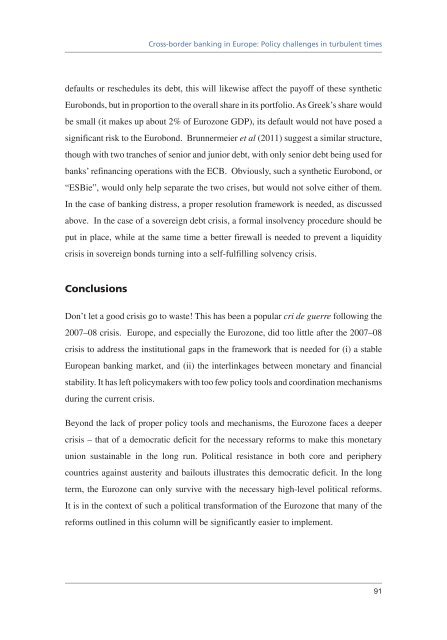Download PDF - Vox
Download PDF - Vox
Download PDF - Vox
- No tags were found...
You also want an ePaper? Increase the reach of your titles
YUMPU automatically turns print PDFs into web optimized ePapers that Google loves.
Cross-border banking in Europe: Policy challenges in turbulent timesdefaults or reschedules its debt, this will likewise affect the payoff of these syntheticEurobonds, but in proportion to the overall share in its portfolio. As Greek’s share wouldbe small (it makes up about 2% of Eurozone GDP), its default would not have posed asignificant risk to the Eurobond. Brunnermeier et al (2011) suggest a similar structure,though with two tranches of senior and junior debt, with only senior debt being used forbanks’ refinancing operations with the ECB. Obviously, such a synthetic Eurobond, or“ESBie”, would only help separate the two crises, but would not solve either of them.In the case of banking distress, a proper resolution framework is needed, as discussedabove. In the case of a sovereign debt crisis, a formal insolvency procedure should beput in place, while at the same time a better firewall is needed to prevent a liquiditycrisis in sovereign bonds turning into a self-fulfilling solvency crisis.ConclusionsDon’t let a good crisis go to waste! This has been a popular cri de guerre following the2007–08 crisis. Europe, and especially the Eurozone, did too little after the 2007–08crisis to address the institutional gaps in the framework that is needed for (i) a stableEuropean banking market, and (ii) the interlinkages between monetary and financialstability. It has left policymakers with too few policy tools and coordination mechanismsduring the current crisis.Beyond the lack of proper policy tools and mechanisms, the Eurozone faces a deepercrisis – that of a democratic deficit for the necessary reforms to make this monetaryunion sustainable in the long run. Political resistance in both core and peripherycountries against austerity and bailouts illustrates this democratic deficit. In the longterm, the Eurozone can only survive with the necessary high-level political reforms.It is in the context of such a political transformation of the Eurozone that many of thereforms outlined in this column will be significantly easier to implement.91














